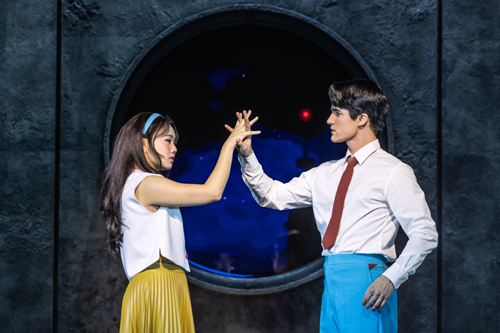What Maybe Happy Ending Means to Me as a Korean American
Helen J. Shen & Darren Criss in ‘Maybe Happy Ending’ (Photo: Matthew Murphy and Evan Zimmerman)
by Chris Peterson, OnStage Blog Founder
I’m still trying to process what it means to see Maybe Happy Ending on Broadway as a Korean American. And honestly, I’m still a little teary. Because this isn’t just another show. It’s something I never knew I was waiting for.
A musical set in a future Seoul, written in Korean by Will Aronson and Hue Park, that found life in Seoul before making its way through Atlanta and finally landing on a Broadway stage? That sentence alone feels impossible. But here we are. And I cannot overstate how deeply that matters.
This show has been around for a while. It premiered in South Korea in 2016 and was a hit — awards, acclaim, multiple revivals. Then there was an English-language version at the Alliance Theatre in Atlanta in 2020, which I remember being quietly obsessed with. And now it’s here. Not Off-Broadway. Not a concert reading. Broadway.
And what blows my mind is that Maybe Happy Ending didn’t become something else to get here. It stayed itself. It’s still about two helper robots, Oliver and Claire, left behind in a near-future world, finding each other in a run-down apartment in Seoul. It’s still about loneliness and connection and the terrifying beauty of temporary things. It still moves at its own quiet rhythm, full of small moments and big feelings.
And I saw it. In a Broadway house. With a cast with AAPI roots. With a book and score that came from Korea. Not watered down. Not filtered. Not explained. Just offered.
As a Korean American, that felt huge.
Growing up, I didn’t see stories like this onstage. I saw white leads fall in love and sing big ballads. I saw Asian characters as sidekicks, punchlines, or lessons. But I never saw anything like this. Two characters who looked like me, speaking with emotional honesty, singing in a musical that came from us, not about our pain, not about assimilation, not about being othered, but about being. About the simple, universal ache of wanting to be loved and not knowing if you’re capable of it.
And it’s set in Seoul. Not generic “Asia.” Not some made-up hybrid city. Seoul. The real one. And the audience leaned in. They didn’t need a map. The show trusted them to understand. And they did.
There’s something radical about that kind of trust.
I think about how many times I’ve softened myself. Explained things. Skipped over parts of my identity because I didn’t want to be too confusing or too much. And then I think about Maybe Happy Ending, this soft, sad, hopeful little show, sitting quietly on 44th Street, asking no one’s permission to exist. Just telling its story. And letting people come to it.
It’s a reminder that we don’t have to contort ourselves to be understood. That the world is finally, slowly, making room for our full humanity.
I’m so proud of this show. I’m proud of Hue Park and Will Aronson for writing something so gentle and profound. I’m proud of the Korean theatre community for nurturing it. I’m proud of the Broadway team for bringing it here without stripping it of its soul.
And yeah, I’m still crying a little.
Because Maybe Happy Ending isn’t just a quiet little robot love story. It’s proof that Korean stories can lead, can resonate, can belong here. And maybe, just maybe, it’s the beginning of something even bigger.
